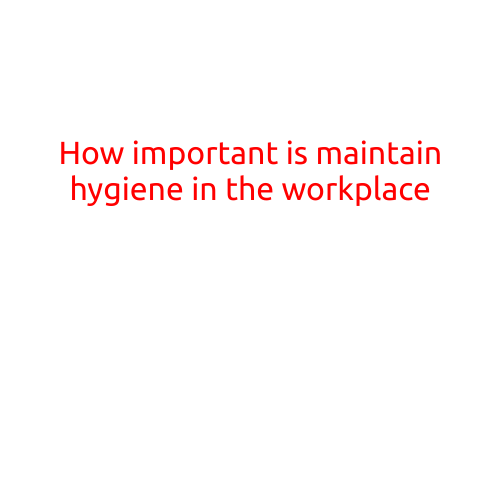
How Important is Maintaining Hygiene in the Workplace?
Maintaining hygiene in the workplace is crucial for the well-being and health of employees, as well as for the success of the organization. Despite its importance, many workplaces may not prioritize hygiene as much as they should. In this article, we will explore the reasons why maintaining hygiene in the workplace is vital and provide some practical tips on how to achieve it.
Why is Hygiene Important in the Workplace?
- Prevents the Spread of Diseases: Poor hygiene practices can spread diseases and viruses easily, which can lead to absences, decreased productivity, and even increased medical bills.
- Boosts Employee Morale: A clean and hygienic workplace can boost employee morale, reduce stress, and create a more pleasant working environment.
- Protects Clients and Customers: In customer-facing industries, maintaining hygiene is essential to ensure the trust and satisfaction of clients and customers.
- Increases Productivity: A clean and organized workspace can improve focus, reduce distractions, and increase productivity.
Common Hygiene Issues in the Workplace
- Poor Hand Hygiene: Failing to wash hands regularly is one of the most common hygiene issues in the workplace.
- Unsightly Surfaces: Failing to regularly clean and disinfect surfaces, such as desks, chairs, and floors, can lead to the spread of germs and bacteria.
- Unpleasant Odors: Unpleasant odors in the workplace can be a sign of poor hygiene practices, such as not regularly cleaning bathrooms or break rooms.
Practical Tips for Maintaining Hygiene in the Workplace
- Establish a Hygiene Policy: Create a hygiene policy that outlines the importance of hygiene and the measures employees must take to maintain it.
- Provide Hand Sanitizers: Place hand sanitizers in strategic locations throughout the workplace to encourage employees to use them regularly.
- Clean and Disinfect Regularly: Regularly clean and disinfect surfaces, including desks, chairs, and floors, to prevent the spread of germs and bacteria.
- Encourage Proper Waste Disposal: Ensure that employees properly dispose of waste, including recycling and trash, to maintain a clean and hygienic environment.
- Monitor Bathroom Hygiene: Regularly monitor and clean bathrooms to ensure they are clean and hygienic, including toilets, sinks, and mirrors.
Conclusion
Maintaining hygiene in the workplace is crucial for the well-being and health of employees, as well as for the success of the organization. By establishing a hygiene policy, providing hand sanitizers, cleaning and disinfecting regularly, encouraging proper waste disposal, and monitoring bathroom hygiene, employers can create a clean and hygienic workplace that promotes productivity, morale, and client satisfaction.





